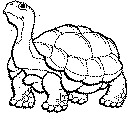We introduced Zeno's Paradox in the very beginning of this class. The purpose was not to frustrate you. I wanted to sensitize you to a point that will come up again and again in this class: Our mental constructs - our more precise 'languages' including logical thinking and mathematical descriptions of phenomena - are NOT necessarily mirrors of the reality that we access through our senses. Here is an example of a situation - Achilles trying to catch up with the frustratingly slow tortoise - and yet he can't! We know, in our sensory universe, that this is impossible - of course Achilles can and will catch up. And, yet, when Zeno expresses this in an apparently more precise language, we cannot point to what mistake he is making. He comes up with an unexpected conclusion - a conclusion which 'reality' as we know it does not support: Zeno 'shows' that Achilles will never manage to catch up with the tortoise.
Here is how it works: Assume that Achilles runs with a speed that is 10 times the speed of the tortoise. We give the animal a 100 yard start - just to be fair. By the time Achilles has covered the 100-yard distance, the tortoise has moved by 10 yards [1/10th of 100]. By the time Achilles has covered the 10 yards, the tortoise has covered 1/10 of that = 1 yard. By the time Achilles has covered that distance [1 yard] the tortoise has moved by 1/10 of a yard. By the time Achilles has covered that, the tortoise has moved by 1/10 of that = 1/100; and so on - 1/1000, 1/1000000, .... The distance becomes infinitely small, but it never becomes zero.
Achilles has to perform an infinite number of tasks to catch up with the tortoise. Mathematicians might tell you that we can estimate the sum of an infinite series - but the key word here is ESTIMATE. The sum of an infinite series is a limit - not the actual outcome of an additive operation. No one - not even a mathematician, can really perform the operation of adding up an ... infinite number of things.
Many famous thinkers have tried to dissolve this paradox - to figure out and point to the little trick that leads to this impressive but obviously wrong conclusion. But, generally, the paradox proves elusive and frustrates and embarrasses those who try to tackle it.
The point we want to make in this class is this: We cannot take it for granted that our mental constructs, which we advance to 'describe' reality, correspond to the reality that becomes available to us through our senses. For instance, in geometry, we deal with lines and triangles, which do not exist in reality! To take one example, geometrical lines have no thickness - no dimensions. Can you ever find, or even imagine, any such line? Can you find a dimensionless line like this? Even if you close your eyes, can you ever imagine such a line?
We will see in this course, especially when we study philosophy of knowledge, that this distinction between 'reality' and the ways we have for describing or grasping 'reality' makes us run into trouble time and again. Our common sense tells us, of course, that there is a correspondence between reality and the ways we have of thinking about reality. But are we sure? How do we know? How can we tell WITHOUT BEGGING THE QUESTION? [This is what this means: we should not ASSUME that our mental constructs do correspond to reality; THIS - the correspondence - is what we would like to prove; but if we are to trust our common sense, we would be assuming it, not proving it!]
No cause to despair. Just bear in mind that we cannot simply trust common sense as we embark on this philosophical journey. In the end, many might actually return to good old common sense, but this too should be the outcome of a sustained philosophic investigation. We want to examine, inquire, question - we do not want to assume anything or take anything for granted simply because it 'looks so.'
Check http://www.pfizer.com/brain/etour7.html for a contemporary-scientific view of the brain's functions; does this view square with the points I have raised above on the occsaion of discussing Zon's paradoxes? In what respects does evolutionary biology - the deeper theory behind medical and scientific view of the brain - prove consistent with the claim that we cannot describe what is out there in the way in which it is out there? Are there differences between the approaches - the philosophic and the evolutionary-biological?

Links
Page with Philosophical Paradoxes and Discussion